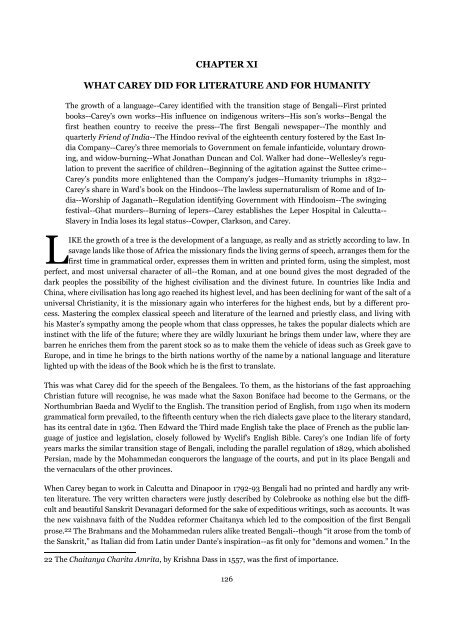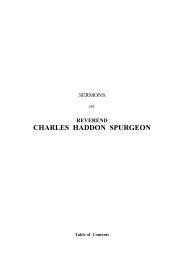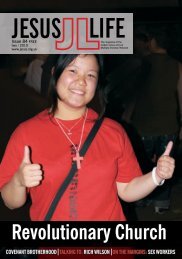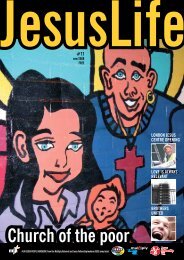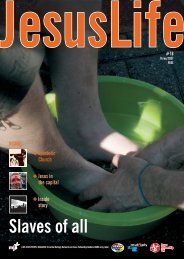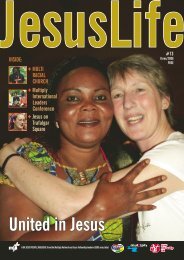Life of William Carey by George Smith - The Jesus Army
Life of William Carey by George Smith - The Jesus Army
Life of William Carey by George Smith - The Jesus Army
You also want an ePaper? Increase the reach of your titles
YUMPU automatically turns print PDFs into web optimized ePapers that Google loves.
CHAPTER XI<br />
WHAT CAREY DID FOR LITERATURE AND FOR HUMANITY<br />
<strong>The</strong> growth <strong>of</strong> a language--<strong>Carey</strong> identified with the transition stage <strong>of</strong> Bengali--First printed<br />
books--<strong>Carey</strong>’s own works--His influence on indigenous writers--His son’s works--Bengal the<br />
first heathen country to receive the press--<strong>The</strong> first Bengali newspaper--<strong>The</strong> monthly and<br />
quarterly Friend <strong>of</strong> India--<strong>The</strong> Hindoo revival <strong>of</strong> the eighteenth century fostered <strong>by</strong> the East India<br />
Company--<strong>Carey</strong>’s three memorials to Government on female infanticide, voluntary drowning,<br />
and widow-burning--What Jonathan Duncan and Col. Walker had done--Wellesley’s regulation<br />
to prevent the sacrifice <strong>of</strong> children--Beginning <strong>of</strong> the agitation against the Suttee crime--<br />
<strong>Carey</strong>’s pundits more enlightened than the Company’s judges--Humanity triumphs in 1832--<br />
<strong>Carey</strong>’s share in Ward’s book on the Hindoos--<strong>The</strong> lawless supernaturalism <strong>of</strong> Rome and <strong>of</strong> India--Worship<br />
<strong>of</strong> Jaganath--Regulation identifying Government with Hindooism--<strong>The</strong> swinging<br />
festival--Ghat murders--Burning <strong>of</strong> lepers--<strong>Carey</strong> establishes the Leper Hospital in Calcutta--<br />
Slavery in India loses its legal status--Cowper, Clarkson, and <strong>Carey</strong>.<br />
LIKE the growth <strong>of</strong> a tree is the development <strong>of</strong> a language, as really and as strictly according to law. In<br />
savage lands like those <strong>of</strong> Africa the missionary finds the living germs <strong>of</strong> speech, arranges them for the<br />
first time in grammatical order, expresses them in written and printed form, using the simplest, most<br />
perfect, and most universal character <strong>of</strong> all--the Roman, and at one bound gives the most degraded <strong>of</strong> the<br />
dark peoples the possibility <strong>of</strong> the highest civilisation and the divinest future. In countries like India and<br />
China, where civilisation has long ago reached its highest level, and has been declining for want <strong>of</strong> the salt <strong>of</strong> a<br />
universal Christianity, it is the missionary again who interferes for the highest ends, but <strong>by</strong> a different process.<br />
Mastering the complex classical speech and literature <strong>of</strong> the learned and priestly class, and living with<br />
his Master’s sympathy among the people whom that class oppresses, he takes the popular dialects which are<br />
instinct with the life <strong>of</strong> the future; where they are wildly luxuriant he brings them under law, where they are<br />
barren he enriches them from the parent stock so as to make them the vehicle <strong>of</strong> ideas such as Greek gave to<br />
Europe, and in time he brings to the birth nations worthy <strong>of</strong> the name <strong>by</strong> a national language and literature<br />
lighted up with the ideas <strong>of</strong> the Book which he is the first to translate.<br />
This was what <strong>Carey</strong> did for the speech <strong>of</strong> the Bengalees. To them, as the historians <strong>of</strong> the fast approaching<br />
Christian future will recognise, he was made what the Saxon Boniface had become to the Germans, or the<br />
Northumbrian Baeda and Wyclif to the English. <strong>The</strong> transition period <strong>of</strong> English, from 1150 when its modern<br />
grammatical form prevailed, to the fifteenth century when the rich dialects gave place to the literary standard,<br />
has its central date in 1362. <strong>The</strong>n Edward the Third made English take the place <strong>of</strong> French as the public language<br />
<strong>of</strong> justice and legislation, closely followed <strong>by</strong> Wyclif’s English Bible. <strong>Carey</strong>’s one Indian life <strong>of</strong> forty<br />
years marks the similar transition stage <strong>of</strong> Bengali, including the parallel regulation <strong>of</strong> 1829, which abolished<br />
Persian, made <strong>by</strong> the Mohammedan conquerors the language <strong>of</strong> the courts, and put in its place Bengali and<br />
the vernaculars <strong>of</strong> the other provinces.<br />
When <strong>Carey</strong> began to work in Calcutta and Dinapoor in 1792-93 Bengali had no printed and hardly any written<br />
literature. <strong>The</strong> very written characters were justly described <strong>by</strong> Colebrooke as nothing else but the difficult<br />
and beautiful Sanskrit Devanagari deformed for the sake <strong>of</strong> expeditious writings, such as accounts. It was<br />
the new vaishnava faith <strong>of</strong> the Nuddea reformer Chaitanya which led to the composition <strong>of</strong> the first Bengali<br />
prose. 22 <strong>The</strong> Brahmans and the Mohammedan rulers alike treated Bengali--though “it arose from the tomb <strong>of</strong><br />
the Sanskrit,” as Italian did from Latin under Dante’s inspiration--as fit only for “demons and women.” In the<br />
22 <strong>The</strong> Chaitanya Charita Amrita, <strong>by</strong> Krishna Dass in 1557, was the first <strong>of</strong> importance.<br />
126


